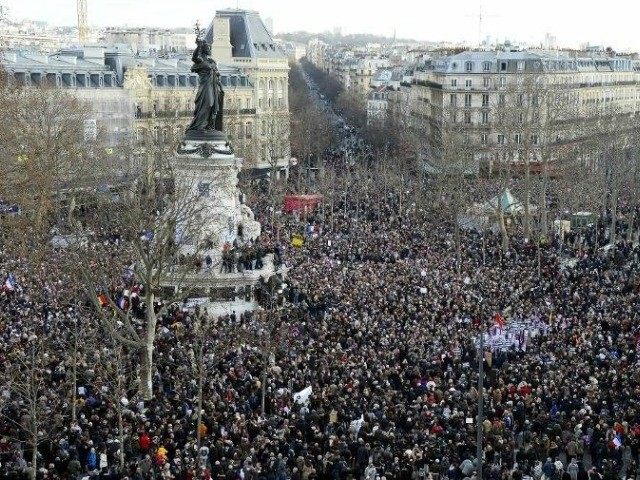For the Obama administration, skipping the Paris unity march was the lesser of two evils. Attending would surely have garnered some praise from the media but it also would have been hard to explain on the domestic and international front.
My colleagues Joel Pollack and John Hayward have both offered plausible reasons why the President and AG Holder might want to miss out on the public unity rally. Joel writes, “After sitting out the “#HandsUpDontShoot” and “#BlackLivesMatter” demonstrations, Obama and Holder were not going to be caught on camera attending a “#JeSuisCharlie” rally in Paris….” There would certainly have been some sort of backlash for choosing to attend this march and not the others. And that’s not the only political problem connected to the rally. John Hayward adds another compelling reason to wonder if avoiding the march wasn’t the lesser of two evils for this administration:
The spirit of defiance surrounding Charlie Hebdo, the desire to honor its slain writers as heroes, is strongly antithetical to Obama’s post-Benghazi position. In fact, at the time, the Obama White House condemned Charlie Hebdo, calling their work “deeply offensive to many” with the “potential to be inflammatory.” It would be a bit awkward for Obama to grace a rally in their honor with his presence and say that, upon reflection, the future should belong to those who are free to slander the prophet of Islam, wouldn’t it?
President Obama definitely falls in the “do not offend” camp when it comes to Islam. This is the administration that classified the Fort Hood shooting as workplace violence. This is the administration that blamed Benghazi on a You Tube video and spent money overseas apologizing for the video.
And yet, none of the possible political motivations for the conspicuous US absence at the Paris march seems to have occurred to the left-wing media. On the contrary, James Fallows immediately framed the question as a right-wing concern in a blatant attempt to rule it out of bounds. When others pointed out that wasn’t really the case, Fallows changed his tune and focused on the size of the President’s security detail. The President had to skip the march.
It’s a bit harder to make excuses for VP Biden who was free Sunday and probably doesn’t have a security detail larger than that of all of the Prime Ministers of Europe. The White House hasn’t offered an explanation for his absence either. Secretary of State John Kerry, who earlier offered a strongly worded reaction to the attack in English and French, was in India and also missed the march. That left the US Ambassador to France and Assistant Secretary of State Victoria Nuland as the only US representatives.
Perhaps the hardest absence to explain is that of Attorney General Eric Holder. Holder flew to Paris for security meetings on Sunday but skipped the march. The NY Daily News reports, “Around the time other world leaders and dignitaries boarded buses to get to the front of the march, Holder was taping an interview for ‘Meet the Press,’ NBC confirmed.” AG Holder told Meet the Press viewers, “the French have been among our best allies, our greatest friends in this fight against global terrorism. And we are here to express our solidarity with them.” So he expressed it he just didn’t show it by marching.
Ron Fournier, who has been a fairly tough critic of President Obama’s leadership, takes another tack on the White House’s apparent snub of the Paris march. “It was a mistake – a missed opportunity to remind France and other allies that the United States is committed to a war against terrorism waged by two U.S. presidents and thousands of U.S. troops since 9/11. But it wasn’t a disgrace,” Fournier writes. Like Fallows, Fournier seems to be making some rather generous assumptions. Did the White House really miss an opportunity for boosting the President’s poll numbers or was this a case of balancing costs and benefits?
For this White House, the calculation had to be made how best to express support abroad without creating additional problems at home. The result was this awkward combination of support minus the images of senior administration figures marching, images which might play somewhat differently back home. Add to that the possibility that the President doesn’t agree with the tone of the march itself and you have a pretty good explanation of how the US didn’t really show up at yesterday’s march.

COMMENTS
Please let us know if you're having issues with commenting.